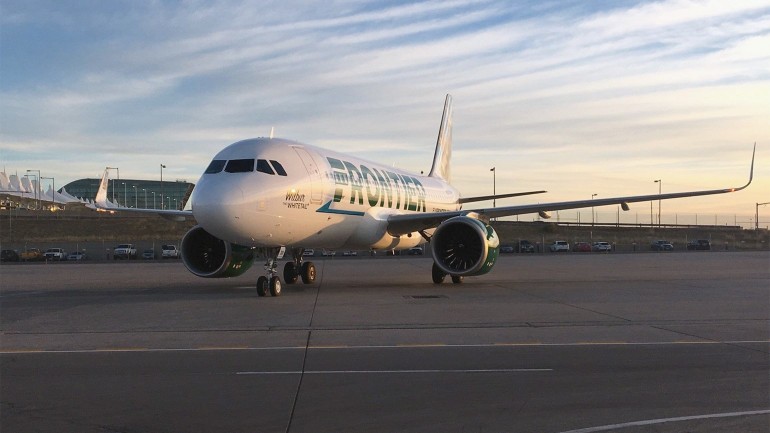Sponsored Listings:
Frontier Airlines’ plan to grow its network by 21 cities while introducing 85 new routes by next summer can be viewed as both a strategic change of direction and a message to Wall Street ahead of an initial public stock offering, analysts said.
“They’re in the process of preparing for an IPO, and I think what they want to show is that they can reliably grow nationally and have a much bigger footprint than they have had in the past,” said aviation analyst Bob Mann of R.W. Mann and Co. “If they can demonstrate that, it is a good story for a road show.”
Frontier, an ultralow-cost-carrier (ULCC), put 49 new routes on sale last week and said it would begin selling tickets for another 36 routes by next spring. Meanwhile, the company said that it will return to 16 cities that it had previously served and offer service for the first time in Buffalo, N.Y.; Charleston, S.C.; Jacksonville, Fla.; Ontario, Calif.; and Pensacola, Fla.
When the expansion is complete, Frontier will fly 314 nonstop routes and serve 82 cities that the airline said account for 90% of the U.S. population.
The expansion announcement comes on the heels of Frontier’s March 31 filing with the Securities and Exchange Commission (SEC) in which it declared its planned IPO with a maximum aggregate offering price of $100 million.
The airline, which since 2013 has been owned by Indigo Partners, has not said when it will go public.
Since purchasing Frontier from Republic Airways, Indigo has transformed the carrier from a mainly Denver-centric carrier to one with a national point-to-point network. In December 2013, 90% of Denver flights touched down or flew from Denver. That figure was halved to 45% by the end of last year, the company said in its March SEC filing.
But with last week’s announcement, Frontier appears to be putting renewed emphasis on its home airport as a connecting hub. Twenty-one of the 85 new routes will serve Denver, and all of those routes will go between the Mile High City and one of Frontier’s new destinations.
“Customers will benefit not only from the broad new selection of nonstop routes, but our growing network will provide more than 1,000 new connecting route options,” Frontier CEO Barry Biffle said in a statement. “By taking advantage of our natural share of connecting passengers, we can offer our low fares to even more of America. This is particularly important through our largest hub and our home in Denver.”
Frontier did not respond to an interview request last week.
Airline Weekly managing partner Seth Kaplan said that in placing a renewed emphasis on connecting traffic, Frontier is reacting to changing conditions in the domestic airline industry.
Until recently, Frontier and fellow ULCC Spirit Airlines were able to expand by connecting big cities that had no low-cost service. But over the past two years especially, legacy carriers Delta, American and United have begun competing aggressively with the ULCCs on such routes. They lowered prices in many markets, for example, and all three carriers now sell highly restricted basic economy seats at prices below their economy seats. United and Delta are selling basic economy fares across their entire domestic networks.
The newfound price competition on direct routes, Kaplan said, has made such markets less profitable, and therefore has made connecting routes more appealing by comparison.
“United and the majors figured out how to compete effectively against these airlines in the big markets, and so they will go on into the smaller markets,” Kaplan said of the ULCCs.
“I do think that Frontier would rather be flying high-volume leisure routes than connecting people between Boise and Louisville,” he said. “But if you’re United and you’re the best connection out of Boise, you don’t love an airline with lower operating costs coming into those markets.”
In surprisingly pointed comments during United’s earnings call last week, president Scott Kirby celebrated Frontier’s expansion announcement, calling it a sign that the ULCC’s move to a point-to-point business model has failed.
“They’re now competing on our turf and trying to be a network carrier in Denver,” Kirby said. “That is a battle I guarantee you United will win.”
But Mann said Frontier’s expansion will go well beyond Denver, suggesting that it is moving toward a hybrid model in which it runs a combination of point-to-point routes and connecting routes through its Rocky Mountains base.
“You fly point-to-point where there is an opportunity to make a return on capital,” he said. “And you have a big enough operation, assuming you are reliable, to make Denver work as a connecting hub.”
On the point-to-point end, Frontier beefed up its Florida network, including 11 new routes from Tampa, nine from Miami, six from Fort Myers, two from Jacksonville, one from West Palm Beach and one from Pensacola.
The carrier will also expand service from Austin and Islip, N.Y., by eight routes each.
A key to making the hybrid model work is operational reliability, Mann said, especially in and out of Denver, where passengers will connect.
On that front, Frontier faces challenges. In the 12 months that ended in May, the carrier had an on-time performance of 73.9%, 10th out of the 12 airlines monitored in the DOT’s monthly Air Travel Consumer Report.
Sоurсе: travelweekly.com










